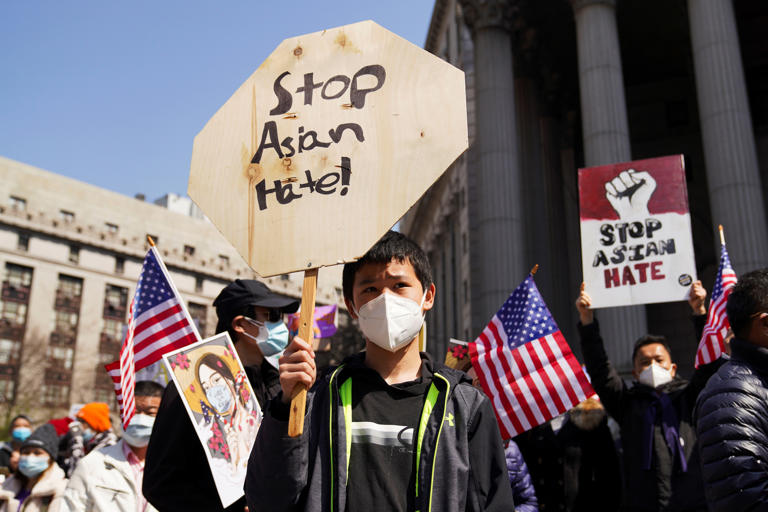‘Stop AAPI Hate’ group launches campaign to prevent candidates from using anti-Asian language

Story by Kimmy Yam
Asian American civil rights organizations are launching a new effort to help monitor and prevent the use of inflammatory anti-Asian political rhetoric, ahead of the 2024 presidential elections.
The “Stop The Blame” campaign, spearheaded by the nonprofit groups Stop AAPI Hate and Chinese for Affirmative Action, kicked off Thursday with a website that includes information on the impact of racist language and policies.
The initiative will ramp up as the election cycle progresses, with the groups monitoring high-profile debates and election stops and publicly holding accountable candidates who use racist speech, according to details first provided to NBC News.
The campaign comes amid escalating tensions between the United States and China, and rhetoric from political leaders and legislation, like Chinese land ownership bans, that have already been deemed by many Asian Americans as discriminatory and racist. Rep. Judy Chu, chair of the Congressional Asian Pacific American Caucus, underscored the campaign’s critical timing.
“This anti-Asian rhetoric, many times, has to do with politicians who are trying to outdo one another,” said Rep. Judy Chu, chair of the Congressional Asian Pacific American Caucus. “They don’t care who they hurt in the process.”
Cynthia Choi, co-founder of Stop AAPI Hate and co-executive director of Chinese for Affirmative Action, explained that the website not only contains data and research on anti-Asian language, but also a tracker that will document states seeking to pass land ownership bans. At least 33 states have proposed bans on land ownership from the Chinese government, entities or citizens in 2023. The website will additionally feature information on different campaigns and initiatives in individual states that are pushing back on anti-Asian policies.
“It’s a way for people to get all the information that they need to understand that this is a serious issue, that it’s going to affect our way of life, and for people to get activated,” Choi said.
They will also be calling on Congress to reform the Foreign Intelligence Surveillance Act. Currently, Section 702 of the legislation givesU.S. intelligence agencies the authority to acquire communications of non-Americans, who use American communications platforms, without a warrant. The measure has been criticized by many Asian American and other advocacy groups for its potential to be weaponized as a tool to racially profile communities of color.
“We’ve seen how policies created under the guise of ‘national security’ are used to scapegoat Asian American communities in the U.S., and they fuel further racism, violence and the erosion of everyone’s rights,” said Ashley Gorski, a senior staff attorney of the National Security Project at the American Civil Liberties Union, which is not a partner in the campaign but “shares the campaign’s objectives.” “Under our Constitution, everyone is entitled to equal protection of the law, but we’re seeing racist policies being promoted on false claims of national security.”
Chu said that the racist language frequently circulated during the height of the Covid pandemic, and subsequent heightened violence toward Asian American communities at the time, proved that words matter. But politicians have not learned from the fallout, she said, citing states such as Florida, Louisiana and Alabama that have since passed land ownership bans.
“We have had three years of anti-Asian hate due to Covid-19. You would think that they would be more sensitive to the needs of [Asian American, Native Hawaiian and Pacific Islanders] in their district. But instead, the opposite is true,” Chu, D-Calif., said. “They are going a road too far when they are prohibiting individuals who may have nothing to do with that policy from being able to exercise their everyday rights.”
Instead of leaning on racist, anti-China rhetoric, Chu said, politicians should be careful with their words, and distinguish between the Chinese government and Chinese individuals. Chu brought up her own experience in which Rep. Lance Gooden, R-Texas, questioned her “loyalty” to the U.S. Chu had defended Dominic Ng, a Biden appointee, who was featured in an article by the conservative Daily Caller, that alleged he had ties to a Chinese Communist Party front group.
“I question her either loyalty or competence. If she doesn’t realize what’s going on, then she’s totally out of touch with one of her core constituencies,” Gooden said in an interview with Fox News in February. “I’m really disappointed and shocked that someone like Judy Chu would have a security clearance and entitled to confidential intelligence briefings until this is figured out.”
Chu told NBC News that politicians should refrain from “doing such things as pointing the finger at individuals here in the United States.”
“It was his way of outdoing other politicians,” she said.
Gooden did not respond to NBC News’ request for comment.
Choi said that with the campaign, she hopes to send elected officials the message that “scare tactics” are not a winning strategy.
“The message is that if you attack our rights and put us in harm’s way, we will take action,” she said. “We won’t stand for it. We will hold you accountable.”
This article was originally published on NBCNews.com
